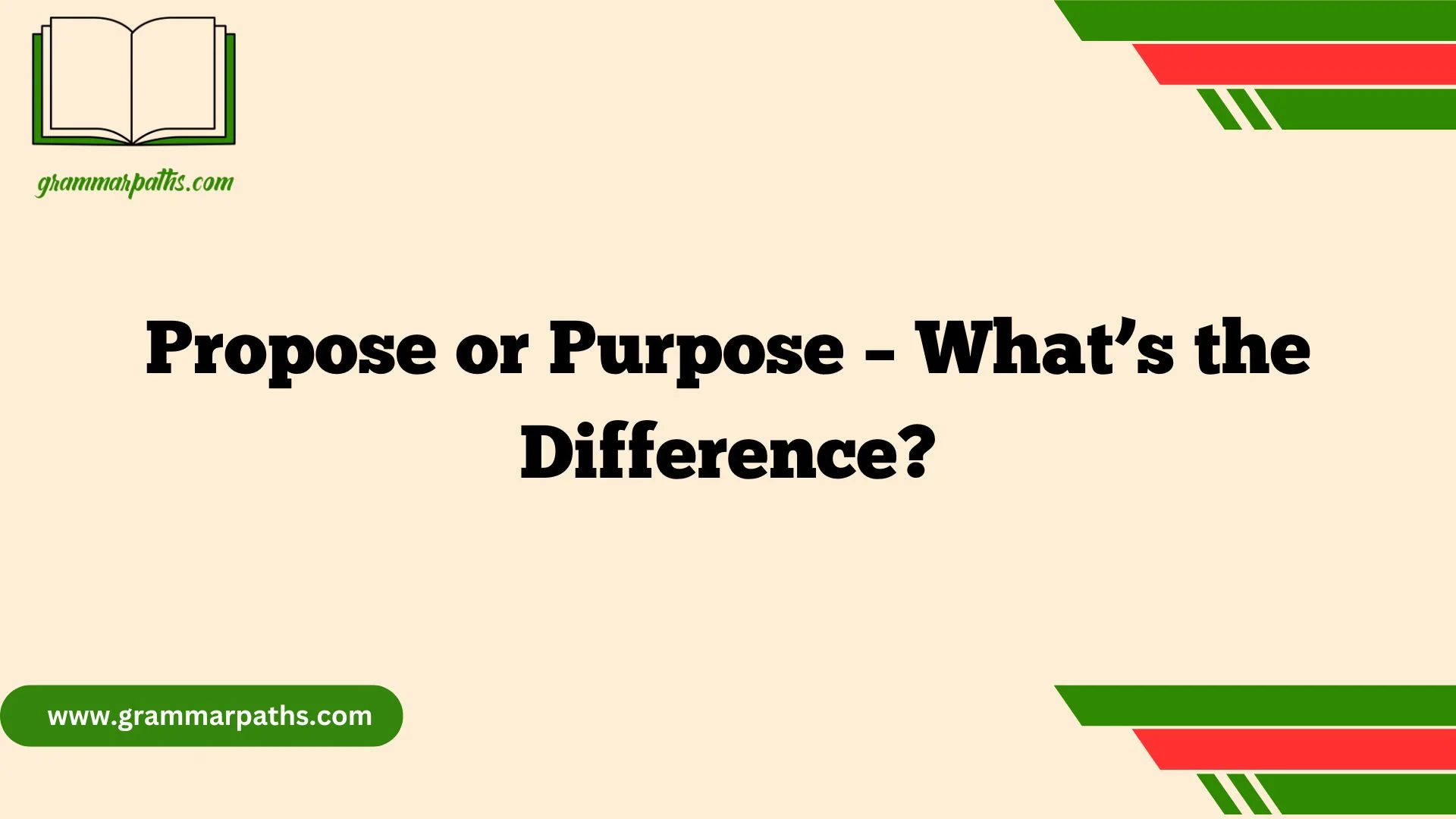Have you ever paused mid-sentence, unsure whether to say propose or purpose? You’re not alone. These two words may sound somewhat alike, but they carry completely different meanings. In fact, confusing them can totally change the context of a sentence, especially in formal writing or professional communication. That’s why understanding “Propose or Purpose – What’s the Difference?” is so important for anyone aiming to speak or write clearly and confidently.
In this article, we’ll explore “Propose or Purpose – What’s the Difference?” in depth, covering definitions, usage, common mistakes, and practical examples. Whether you’re crafting a business proposal, outlining your goals, or simply brushing up on your English grammar, knowing when to use each term will instantly elevate your communication.
We’ll break down each term with simple explanations, highlight their differences in both spoken and written English, and provide real-life scenarios to help you avoid common pitfalls. So if you’ve ever found yourself second-guessing the right word, stick around—we’re about to clear up the confusion once and for all by answering the essential question: “Propose or Purpose – What’s the Difference?
What Does “Propose” Mean?
Propose is a verb that means to suggest a plan, idea, or course of action. It’s dynamic—it involves offering something for consideration, whether that’s a business idea, marriage, or even legislation.
Origin of the Word “Propose”
- Etymology: From Latin proponere, meaning “to put forward”
- Related to: “proposal,” “proposition,” “proponent”
Use Cases for “Propose”
Here’s when and how you’ll commonly see “propose”:
- Business: “The consultant proposed a more efficient workflow.”
- Academia: “The researcher proposed a new hypothesis.”
- Personal Life: “He proposed to her on the beach.”
- Politics: “They proposed an amendment to the constitution.”
Examples in Sentences
- “Let me propose a different approach to solving this.”
- “The board proposed a merger between the two companies.”
- “She proposed that we meet next week.”
Key insight: Use “propose” when you are putting an idea forward or offering something.
What Does “Purpose” Mean?
Purpose is a noun that refers to the reason for which something exists, is done, or is created. It’s static, grounding, and conceptual—linked to goals, motivations, or meanings.
Origin of the Word “Purpose”
- Etymology: From Old French porpos, derived from Latin proponere (similar root to propose, but evolved differently)
- Related words: “intent,” “goal,” “mission”
Use Cases for “Purpose”
“Purpose” is used to define why something is done. It’s popular in:
- Personal development: “Finding your life’s purpose”
- Business branding: “Our purpose is to create sustainable solutions”
- Education: “The purpose of this study is to identify trends”
Examples in Sentences
- “The purpose of this meeting is to finalize the budget.”
- “She lives with a sense of purpose.”
- “Every product is designed with a purpose in mind.”
Key insight: Use “purpose” when referring to a reason, goal, or intended outcome.
Propose vs. Purpose: Side-by-Side Comparison
| Feature | Propose | Purpose |
| Part of Speech | Verb | Noun |
| Core Meaning | To suggest or offer | The reason or intent behind something |
| Common Uses | Suggestions, ideas, marriage, plans | Goals, intent, motivation, mission |
| Example | “I propose a toast.” | “Her purpose is to serve the community.” |
| Forms | Proposes, proposed, proposing | No verb form; stays as a noun |
How to Use “Propose” in Context
Let’s dive deeper into how “propose” works in real-world communication.
In Professional Settings
- Formal Writing: “This policy proposes an incentive for early adopters.”
- Emails: “Can I propose a new timeline for the project?”
- Meetings: “I’d like to propose a different vendor for the contract.”
In Romantic Contexts
- “He got down on one knee and proposed.”
- “She proposed during their anniversary trip to Rome.”
In Legal and Political Contexts
- “The senator proposed stricter data privacy laws.”
- “The board proposed new bylaws for the organization.”
Mini Tip Box:
✅ Use “propose” when there’s an action being offered or recommended.
How to Use “Purpose” in Context
“Purpose” is often tied to vision, mission, or meaning.
In Personal Development
- “Her purpose is to help underprivileged children.”
- “Finding a clear purpose can improve mental well-being.”
In Company Missions
“Our purpose is to redefine how the world connects and communicates.”
– From Meta’s official mission statement
In Education or Research
- “The purpose of this experiment is to observe chemical reactions.”
- “State the purpose of your research clearly in the abstract.”
In Product Design
- “This app’s purpose is to track your productivity.”
- “Every feature serves a clear purpose.”
Common Mistakes to Avoid
People often confuse these two in writing and speech. Here’s where things go wrong:
Incorrect Sentences
- ❌ “The propose of this event is to raise funds.”
✅ Correct: “The purpose of this event is to raise funds.” - ❌ “He purposed a new plan.”
✅ Correct: “He proposed a new plan.” - ❌ “Can I get your purpose on this matter?”
✅ Correct: “Can I get your proposal on this matter?”
Why These Errors Happen
- Both words come from similar Latin roots.
- Their spelling and pronunciation are close.
- ESL learners often default to one based on context without checking the part of speech.
Pronunciation Guide
| Word | IPA | Pronunciation Tip |
| Propose | /prəˈpoʊz/ | Emphasis on second syllable |
| Purpose | /ˈpɜːrpəs/ | Emphasis on first syllable |
Quick Sound Hack:
- “Propose” has a “z” sound at the end.
- “Purpose” ends with a soft “s.”
Synonyms You Should Know
Synonyms for “Propose”
- Suggest
- Recommend
- Advocate
- Offer
- Put forward
Synonyms for “Purpose”
- Goal
- Objective
- Aim
- Reason
- Mission
Important Note:
These words can’t always replace each other. For example, you can’t say “I goal we meet next week”—but you can say “I propose we meet next week.”
Mini Case Study: When Misusing Words Costs You
Scenario: A job applicant writes in their cover letter:
“My propose for joining your company is to grow my skills.”
This one mistake could signal a lack of language mastery, even if they’re highly qualified.
Corrected:
“My purpose for joining your company is to grow my skills.”
Lesson: Precision in language shows professionalism and fluency—critical for job seekers, writers, and public speakers.
Quick Quiz: Test Your Knowledge
Fill in the blanks with either “propose” or “purpose”:
- The main ________ of this study is to understand climate change.
- I would like to ________ a new design layout.
- They have a clear ________ behind this innovation.
- She ________ that we meet tomorrow instead.
- What’s the ________ of this meeting?
Answers:
- Purpose
- Propose
- Purpose
- Proposed
- Purpose
Key Takeaways
- “Propose” = Action verb meaning to suggest something.
- “Purpose” = Noun meaning the reason or intent behind something.
- Don’t confuse the function: One offers, the other explains.
- Use “propose” in plans and suggestions.
- Use “purpose” in goals and reasons.
Why This Matters More Than You Think
Choosing the right word isn’t just about grammar—it’s about clarity, professionalism, and impact.
If you’re writing a business pitch, academic paper, job application, or even just a thoughtful text message, mixing up these words can lead to misunderstanding or confusion.
Mastering this small difference helps you:
- Write with confidence
- Speak more precisely
- Avoid embarrassing errors
- Enhance your credibility
FAQS
Q1: What is the difference between purpose and propose?
Purpose is a noun meaning the reason or goal behind something. Propose is a verb meaning to suggest an idea, plan, or offer, often formally.
Q2: What do you mean by propose?
To propose means to put forward an idea, plan, or suggestion for consideration, or to ask someone to marry you.
Q3: What is the difference between propose and propose to?
Propose can refer to suggesting an idea. Propose to specifically means asking someone to marry you.
Q4: How to use propose?
Use propose when suggesting something: “I propose we leave early.” Or in romantic contexts: “He proposed to her.”
Q5: What is proposal and its purpose?
A proposal is a formal suggestion or plan, and its purpose is to present an idea for approval, whether in business, academics, or relationships.
Q6: Can a girlfriend propose?
Yes, absolutely! A girlfriend can propose—there are no rules on who must initiate a marriage proposal.
Conclusion
By now, the confusion between “Propose or Purpose – What’s the Difference?” should be a thing of the past. While the two words may seem similar at a glance, they serve entirely different roles in the English language. To propose is to suggest, offer, or put forward an idea, while purpose refers to the reason, intent, or goal behind an action.
Understanding “Propose or Purpose – What’s the Difference?” helps you use the right term with clarity and confidence in both academic writing and everyday conversations. Whether you’re drafting a proposal, sharing your intentions, or explaining your motivation, using the correct word adds precision and professionalism to your language.
So the next time you find yourself writing a sentence and hesitating between these two, remember what we’ve discussed in “Propose or Purpose – What’s the Difference?”. Being mindful of their definitions and contexts ensures your message is clear, polished, and grammatically sound.
In short, mastering the difference between propose and purpose is a small but powerful step toward becoming a more effective communicator. Keep practicing, keep learning, and you’ll never mix them up again. That’s the true purpose of this guide—and the idea we proposed from the start!

Grace Marie is the dedicated writer behind GrammarPaths.com, where she shares her passion for English grammar, idioms, and writing mastery. With a strong background in language studies and years of experience helping learners improve their communication skills, Grace creates clear, practical, and engaging content that makes English easy to understand.












